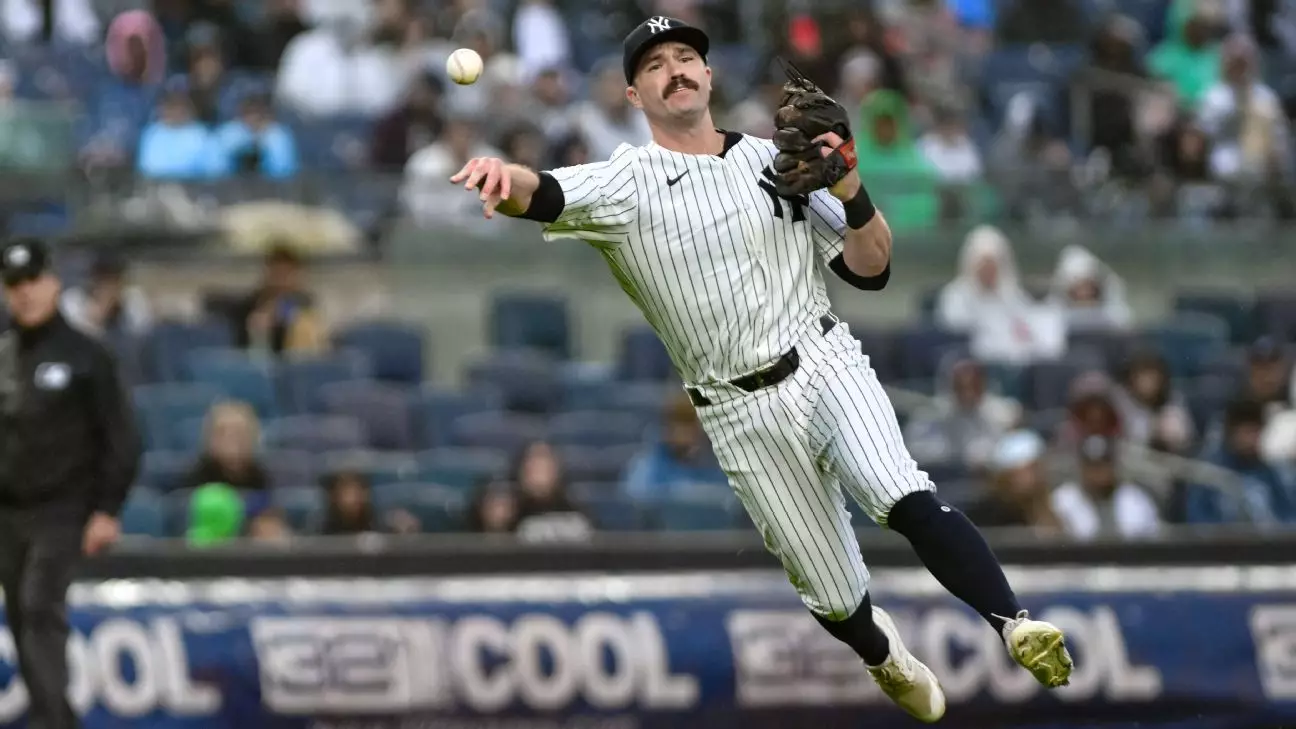In an unexpected turn during the AL Division Series, the New York Yankees found themselves needing to adapt quickly due to an injury to veteran first baseman Anthony Rizzo. With Rizzo sidelined due to fractured fingers, Yankees manager Aaron Boone showcased his strategic maneuvering by starting Jon Berti at first base for the first time in his professional career during Game 2 against the Kansas City Royals. This decision highlights not only the challenges faced by teams when key players are injured but also the underlying flexibility and versatility that defines many successful teams in Major League Baseball.
Jon Berti, who was acquired from the Miami Marlins just ahead of the season opener, has previously shown his capability on the field by playing various positions, including second base, third base, and left field. His performance during the regular season, accumulating a batting average of .273 across 25 games, exemplifies his readiness for the moment. Berti’s potential as a first baseman may have initially raised eyebrows, given his limited experience in that position; however, Boone seemed confident in his abilities, stating, “He’s looked outstanding over there.” This confidence underscores a broader theme—players must be ready to step outside their comfort zones and adapt to dynamic game situations, especially during high-stakes moments.
As the postseason progresses, the Yankees’ pitching rotation also faces modifications, with Clarke Schmidt set to start Game 3, opting for him over rookie Luis Gil. This decision is critical, as postseason games heavily rely on strategic pitching matchups that can heavily influence the outcome. Schmidt, boasting a solid 5-5 record and a 2.85 ERA through 16 starts this season, brings reliability to the mound. His experience—despite having missed significant time due to injury—may offer a stabilizing presence as the Yankees navigate the intense pressure of the playoffs.
The decision to start Schmidt rather than Gil also speaks to Boone’s baseball acumen, particularly when considering the comparative statistics of both pitchers. While Gil posted impressive numbers with a 15-7 record and 171 strikeouts, his high walk rate of 77 in 151⅔ innings raises concerns about his command under playoff pressure. Schmidt, being more seasoned and adapting well to challenges, may be considered the safer choice to guide the Yankees through critical playoff innings.
Rizzo’s injury could be seen as a setback, yet it also opens the door for lesser-known players like Berti and contributions from others in the roster. Oswaldo Cabrera, who started at first base in Game 1, showcased admirable defensive skills, further proving that the team can lean on a variety of players when the situation demands. This unpredictability in player contributions highlights a crucial aspect of team sports: resilience and adaptability serve as vital ingredients for success, particularly in a tumultuous postseason environment.
Fans and analysts alike will be watching how Berti and the rest of the Yankees adjust in the wake of Rizzo’s absence. While the pressure mounts, there is also a collective theme of hope. Rizzo retains the possibility of returning should the Yankees advance, adding an intriguing layer to the unfolding drama of their postseason journey.
The road to a potential Championship Series will be fraught with challenges as the Yankees face formidable teams, emphasizing the need for tactical depth. Boone’s ability to utilize his players’ versatility and skill can create advantages in critical matchups. As the postseason unfolds, the narrative of the Yankees is not just about the players on the field, but also about the team’s strategic depth and the collective effort to overcome adversities.
The Yankees are at a crossroads, having to redefine their strategies as they strive for playoff success. The adaptation to Rizzo’s injury, the choice of starting pitching, and the potential impact of players like Berti emphasize the crucial blend of planning, resilience, and opportunity that defines baseball during its most thrilling stage. As they proceed further into the postseason, the spotlight will remain on their ability to navigate this landscape, proving that in baseball, as in life, adaptability is key to success.

